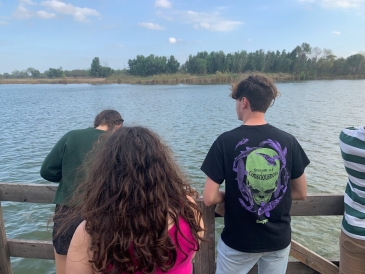
Texas! Part 2
In my previous blog post, I wrote about traveling with the Dartmouth Center for Social Impact along the Texas-Mexico border in order to learn more about the national refugee crisis and life on the border. Before you read part 2, check out part 1 here. Through sharing my experiences in this blog post, I hope to provide a closer look at this specific program, and a general idea about how winter break trips might be run at Dartmouth.
After Del Rio, we drove down to Eagle Pass for a much-needed rest day. After 5 straight days of programming, we took a day to eat, do laundry, and relax! Personally, I was watching Poland in the World Cup—unfortunately, we went out in the first round of 16 to France. Their team is looking really strong this year; you heard it here first, France will win the 2022 World Cup.
The next day, we went down to Laredo to learn more about film and art on the border. We met with the founder of the Loredo Film Society to talk about storytelling and film in Laredo; she told us about how her organization brings the community together and showed us some documentaries made by Laredo residents! It was a really fun way to be introduced to the community, and I'm excited to see some of the documentaries we watched be fully released.
The following day, we headed to McAllen to talk with Marianna Wright, executive director of the National Butterfly Center. She shared with us the many environmental impacts the border wall has on local ecosystems; in addition, since her property is actually on the border, the government has been trying to build a border wall on it for the past few years. Unlike her neighbors, she is resistant to the government's request, despite all their attempts to claim it under eminent domain. It was interesting to talk about her experience, and heartbreaking to hear stories about pro-wall advocates who harassed her, spread rumors about her, and even committed crimes and arson on her property.
On our last day, we headed down to Brownsville. We first spoke with La Posada Providencia, a non-profit on the border which houses mirants once they come out of detention centers. Due to our large group size (15!), I'm glad we were able to use our manpower to help the gardeners with some simple tasks that they no longer would have to waste their time on. We next headed to the Harlingen immigration court to sit in on some removal hearings. We finished the day working with Team Brownsville to pack lunches and hygiene kits for migrants.
Overall, the trip was a great way to meet different people and learn more about the refugee crisis happening on the border. It can be easy to feel far-removed from these issues when reading about them on the news; I feel that getting a small look at life on the border will help me to better understand the headlines we read everyday. I wish more people could have these types of experiences because perhaps there would be a little more justice across our systems; however, I hope to use the privilege of going on this trip to engage with my own community in working towards justice for all.
















